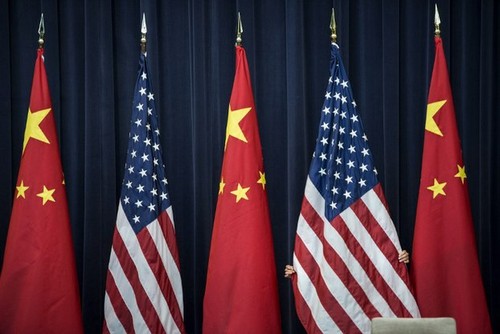(VOVworld) – Since Donald Trump was sworn into the office on January 20, observers have been uncertain about US-China economic ties.
 |
| US and Chinese flags at the US State Department in Washington DC |
The relationship between the US and China is important to the world. The world’s largest and second largest economies are bound to generate friction. Observers predict that the US’s ruling Republican Party is likely to radically change Barack Obama’s foreign policy.
Pending issues
America’s goal to rebalancing Asia, the “one China” policy, and trade imbalance are the big issues of US-China relations. The US charges import tariffs of 2-3% while China’s import tariffs are 3-9%. The US accuses China of violating WTO regulations, which hurts US trade. When Obama left the White House, bilateral trade ties were at a 15-year low.
Since his inauguration, President Trump has made several tough statements about China, and has put China on the list of currency manipulators subject to sanctions. Trumps says the Yuan is pegged 20-45% lower than its actual value to make Chinese products more competitive, and has threatened to increase tariffs to 45% on Chinese goods if no adjustment is made. He has also said that the US’s biggest mistake of the past century was letting China join the WTO. Since China’s WTO admission 10 years ago, the US has lost more than 70,000 factories, Trump said.
Trump’s tough stance is not ungrounded. China has become increasingly hostile to foreign companies, and has aggressively acquired foreign firms. State-funded companies are buying up foreign firms to serve China’s industrial modernization strategy called “Made in China 2025”.
Dim prospects
The US-China relationship involves both cooperation and conflict, and that is likely to be continued under President Trump. As a businessman, Trump will give high priority to economic advantage and the trade war with China is likely to deteriorate. But keeping the President’s promise to increase tariffs will trigger retaliatory measures from China. Beijing warned of cancelling its purchase of Boeing aircraft, banning the iPhone, and blocking the import of corns and soybeans if Trump wages a trade war. Higher tariffs could hurt US consumers because apparel and electronic goods imported from China are no longer produced in the US or are produced by US companies based in China.
China has proved itself to be resistant to outside pressure, but Trump has vowed to take a tougher stance than his predecessor. So, the future of US-China relations and therefore the future of the global economy are very much in doubt.